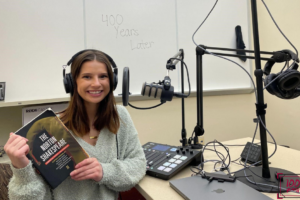Creativity is for us all. When we put writing, painting, drawing, sculpting—or general making—on a pedestal as something that artists get to do, we sever an essential connection within people: The connection of self to creativity. In the age of the internet, so much of life centers around consumption. Consumption is easier than creativity; there is less at stake, it requires less momentum. As a result, only a fraction of us create consistently. This is a terrible mistake. If we are all human, then we are all creative.
It is telling that children, regardless of talent, create. Toddlers scribble with crayons, marveling at the colors they are wielding. Older children write stories, poems, comics. They perform plays and sing. The world of art is open and unfurled for children. Not because the universe is kinder to children, but because, when a child makes art, it doesn’t have to be good. A child’s creation doesn’t have to prove anything.
Many times, a child will even create something, smile down at it, then put the thing away and never look back or think twice. Perhaps, this is why children are so full of joy.
The world needs bad poetry—if such a thing even exists—because people need to create. Exercising our creative power may be a human requirement for happiness, and, if it isn’t, it must be pretty close. For every good thing I create, I create heaps of things only I will ever appreciate, and that’s okay. When I just need to feel the release of creativity, when I need to feel the divine moving through me, I pen “bad” poetry in my private journal, although, I don’t believe there is such a thing.
For every “bad” thing I create, there is a “bad” thing I see. I have read poems and novels and I’ve heard music and thought, quite sharply “this is . . . just okay?” I would never say the world shouldn’t celebrate fine art. I physically hug superb novels, sometimes while crying, and understand that to experience fine art is to experience magic. But I am saying we all should create in our own ways, in our own spheres, without no expectations of fine art. There is, and always will be, something precious about the act of creation, which makes me respect bad poetry, even if I don’t want to re-read it. I even reject the idea of bad poetry all together. Isn’t creating, regardless of the outcome’s artistic merit, our, small, human way to invoke divinity? Isn’t blasting amateur creatives for not making Art like blasting a jogger running around the block for not winning an Olympic race? Painting, running, writing—it’s all exercise in the end.
I would argue that creative exercise is as essential as physical exercise. And, if more of us were creatively fit, more of us would (although perhaps this seems paradoxical) think more like individuals and feel more like a family. This is because, in a world where we all create, we would all think something like, “The creative force flowing through me is flowing through you! I put myself on the line and create, and look, so do you!” Our creativity isn’t all our own, it doesn’t sprout within us. Creativity is around us; creativity is ethereal, unseeable. It hangs over our world like an omnipotent force.
We humans are the vessels creativity merely moves through to come to life.
Children remain open to these whispers of creativity from the universe.
They create in a multitude of ways, scribbling and building with blocks, playing make believe, having imaginary friends, singing their hearts out. Creativity has so many outlets, whether you decorate, garden, practice carpentry—there are many ways to invoke the creative spirit that permeates our world. It is essential to remember that children don’t subdue their creativity out of embarrassment or fear of judgment; children create blissfully and freely.
I’ll leave you with a quote from Ursula Le Guin: “The creative adult is the child who survived.”
 Anna Donch
Anna Donch
Alpha Epsilon Alpha Chapter, Alum
The College of New Jersey, Ewing, NJ
Sigma Tau Delta
Sigma Tau Delta, International English Honor Society, was founded in 1924 at Dakota Wesleyan University. The Society strives to
- Confer distinction for high achievement in English language and literature in undergraduate, graduate, and professional studies;
- Provide, through its local chapters, cultural stimulation on college campuses and promote interest in literature and the English language in surrounding communities;
- Foster all aspects of the discipline of English, including literature, language, and writing;
- Promote exemplary character and good fellowship among its members;
- Exhibit high standards of academic excellence; and
- Serve society by fostering literacy.
With over 900 active chapters located in the United States and abroad, there are more than 1,000 Faculty Advisors, and approximately 9,000 members inducted annually.
Sigma Tau Delta also recognizes the accomplishments of professional writers who have contributed to the fields of language and literature.






Add Comment